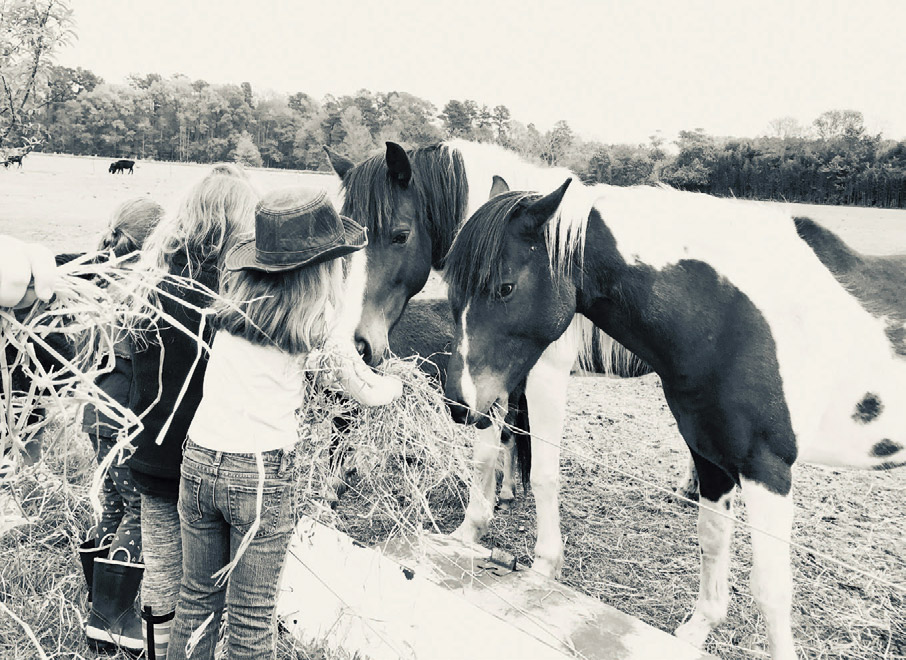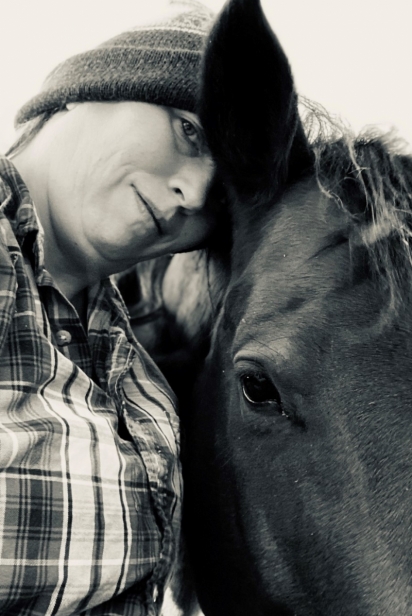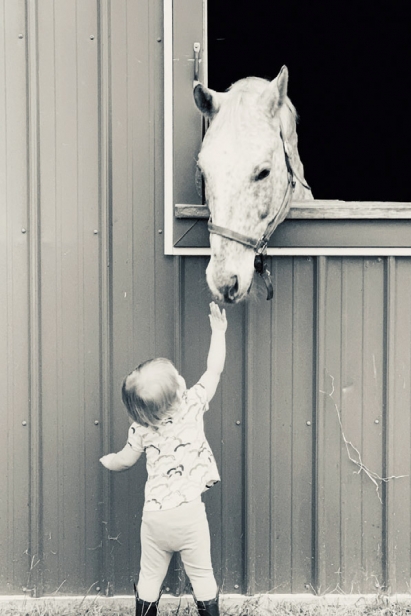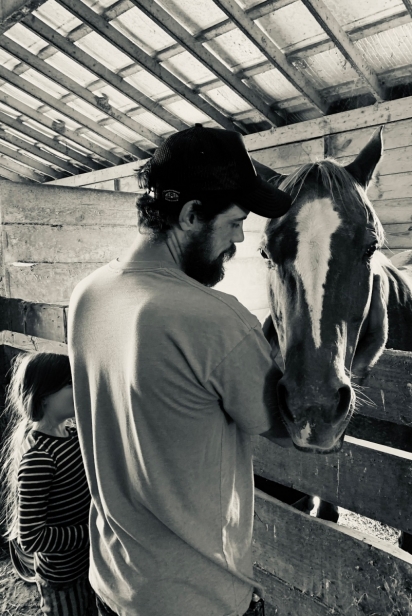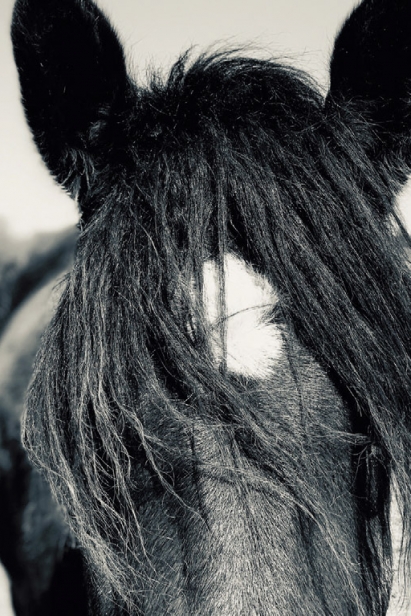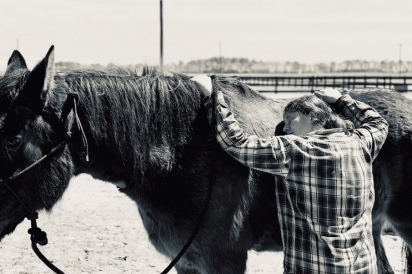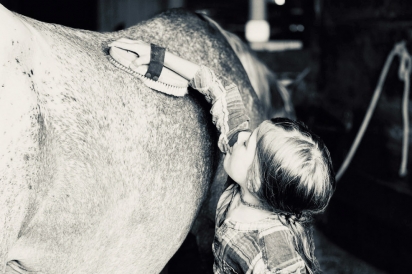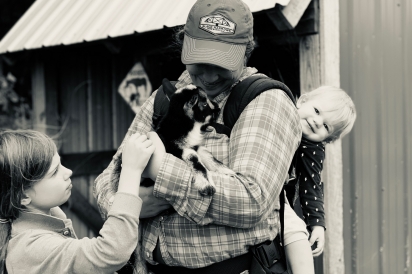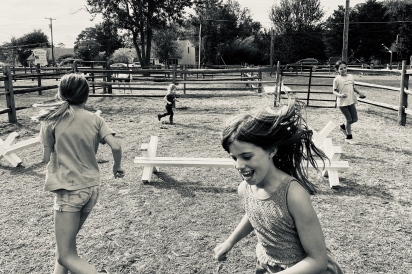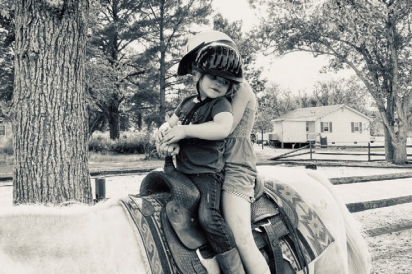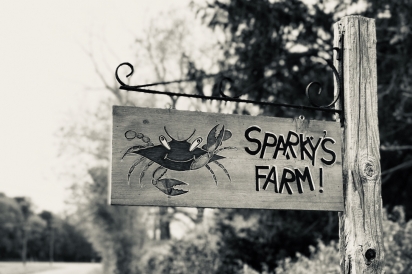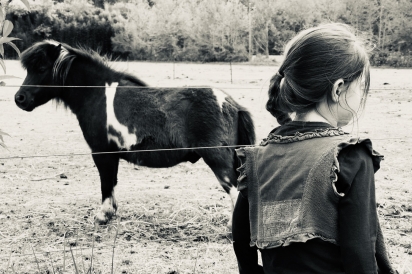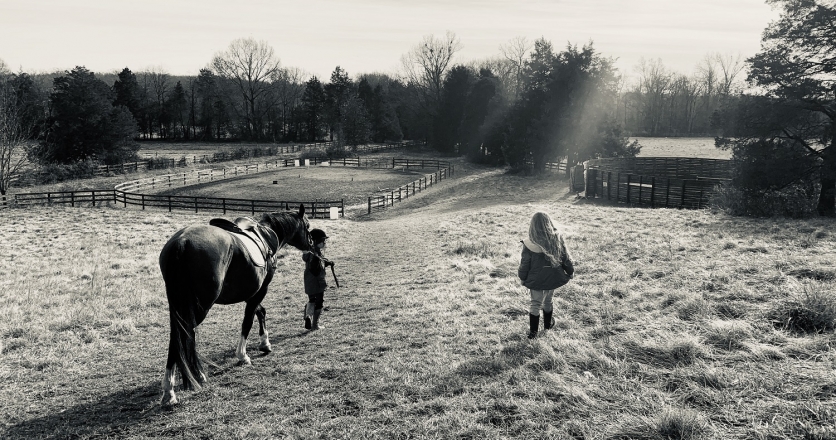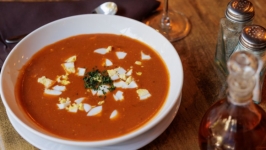Feeding Horses, Feeding the Soul
So often it’s in serving something larger than ourselves that we find purpose in this life.
All of us, people and animals alike, have a hierarchy of needs we need met. At the most basic level we need air, water, food, sleep, etc., to function. Further up the rung, we find that we need similar things like space, flow, fuel, rest, etc., for the soul. Without these resources, our bodies will fail and fall into sickness and our souls will flounder and fade. We have all felt these effects at one time or another, and surely now more intensely because of the pandemic.
A couple of years after my family moved to Delmarva we opened Black Narrows, the first brewery on Virginia’s Eastern Shore. At the time, I was pregnant with our second little girl. I plowed through work and life with that sweet baby in my belly. I was determined to do it all. I was going to balance my vision and storytelling work for Black Narrows with my hopes and dreams for motherhood. My fierce little Ethel Mae made her way into the world and with her came little sleep, overwhelming joy, and too many tears to count.
While trying to navigate postpartum depression, a new family business, and writing, my oldest daughter Emma broke down trying to fit into a system that wasn’t set up to handle an ADHD fire-wired child. After trying a few different methods, including another school, and finding her spirit broken, I said, “To hell with this.” What she really needed was more time outside, to run and play and be a child. We needed to get back to nature. The more I researched, the more I kept going back to the idea of working with horses.
Thanks to the efforts of the Chincoteague Bay Field Station, Em and I had participated in the SPARK program through her local school. The program helped foster environmental science interactions outside the classroom and encouraged STEM learning. This was the best part of “school” for her, exploring and experimenting outside, especially when we visited Sparky’s Farm in rural Accomack County in the spring and fall. I replayed the reel in my head, Em feeding the horses and holding the goats. I saw the joy in her eyes when she ran through the field and rolled down the hill.
We raised a pair of bonded rabbits we bought from Queen Hive Farm, and I remembered how they rescued horses and trained them for the trails in their back woods. I got on the phone with their owner, Jennifer Cording, told her a little about Emma, about homeschooling and what we hoped to learn. We agree that in exchange for riding lessons with barn hand Hannah Herring, our family (including Ethel on my back) would disperse the morning feed each week for the chickens, rabbits, goats, sheep, and their Jersey cow Chuck Beef.
Together, Em and I would go in the evening once a week for lessons with the horses. We learned how to put on a halter and attach the lead line. We watched how Hannah led them and talked to them, especially when they spooked at something or misstepped or took advantage of a situation. We learned their mannerisms and personalities and quirks. We started to notice their mood changes, if they were not feeling themselves or anxious to reunite with their friends in the paddock.
In turn, there was no hiding our true selves and all the emotional baggage we carried with us day in and day out. The horses could feel it when we were upset, and their bodies would often tense up too. Some days we’d have to stop and breathe and take a moment to regroup before walking into the barn. We’d apologize to one another for yelling in the car and begin again. We learned to let go and start over.
After working at the Farm for a few seasons, I felt a shift in my heart and in my soul. The horses weren’t just changing Emma’s life, but also my own. Something happened to me, physically and emotionally. I started running to the barn on my own once a week to help Hannah with the evening feed and turn out. I started to notice what “breathing room” looked like in my life. I put words to my once muddled needs and wants. I found my voice again, I found myself. I found the person, the soul, beyond family, beyond work, beyond the labels the world slapped on me.
Often I stood on the fence, watching. I watched the horses while they played and while they grazed. I picked up on the herd mentality and pecking order, and was determined to understand the why behind it all when they interacted with one another. Being there, I learned more about their true selves and their wants and needs. Later, I taught myself how to groom in a more therapeutic way, with lots of soothing strokes and rubs before each ride. I also adjusted my usual pattern of speech, talking in a lower, slower voice.
As life’s page turned and things got busier, my husband Josh and baby Ethel moved on from Farm chores and Em and I turned our attention to the Chincoteague Pony Centre closer to home.
Our love for horses only grew. Five days a week I turned the key to the barn door, greeted my friends, filled feed buckets, and we ate breakfast together before the sun was up. I played rhythmic meditation music for us all while we finished our food.
Together with barn volunteers John and Arlene Blake, we checked on the horses, talked with them and turned them out each morning. While Em helped muck stalls, I grabbed my gloves and spread out the hay each day. I often took longer than needed, watching them eat, listening to their neighs and whinnies and other means of communicating with one another. I’d take my coffee and sit inside the paddock while they frolicked and foraged. While Em grew fonder of riding and learning the basics of jumping, my only desire was to know more about providing care and comfort.
I pestered mom-and-daughter-team Lou Mavromatis and Chelsie Kenlon with question after question about different grains, hays, salt, water and other nutrients. I studied each horse’s gait and body structure and wondered what made them move and act the way they do. I checked out horse books from the library and bought some from our local bookstore. I was like Alice following the white rabbit down the hole, except the rabbit was a quarter horse weighing fourteen hundred pounds.
Each time my hands poured a bucket of feed and each time the horses came to me for a rub at the fence, my heart was full. I didn’t hand feed them treats or pretend they were mine. I knew my place in the barn, for the most part. I wasn’t their momma, working them and riding them daily. I was their Auntie J. I had to earn their respect. There were times they tried to get away with things because I was the “Auntie,” but I learned to set them straight with my own “mama bear” tone. I had to be calm and confident in some sticky situations.
Horses pick up on fear and worry. They will sometimes mirror that and wonder if there’s something wrong, something lurking around the bend. Lou taught me to be aware of my body language whenever I was handling horses. Being prey animals, their brains are wired differently than ours. I realized quickly when feeding and working with horses, there’s a lot of awareness you have to learn over time. There were moments when it felt overwhelming. Once I found a flow, however, it got easier, almost like learning a foreign tongue when you practice it regularly.
I found that in feeding horses, in caring for their physical and emotional needs, my own were being met. Serving them struck a chord so deep inside my heart. I didn’t know I could love an animal like they were a kindred spirit. I find that I’m often more myself with them than around people. I found a missing link that I’d been longing for my entire life. Now, my family is complete. I hope I get to be “Auntie J” to many more horses across the Delmarva peninsula.
I will continue to tell stories and write and school my babies, but I’ve found the thing I want to do when I’m old and gray. Slowly, I’m taking classes to become an Equine Massage Therapist + Nutritionist. Over the next few years, I look forward to learning from many teachers, both human and horse. I hope you’ll find me one day with long hippie hair, a fist full of herbs and an armful of hay, feeding the horses, talking to them about the full life I’ve lived.
I hope you, too, find the thing that fuels you, nourishes you. Feed the horses or till a garden or hone a craft. So often it’s in serving something larger than ourselves that we find purpose in this life. When we dig in and tend to our souls, that’s where the light comes in. I guess that’s the beautiful thing about the broken world we’ve been living in, that there’s hope for a brighter future. There’s hope for finding new food for our souls – if we forage for it.


